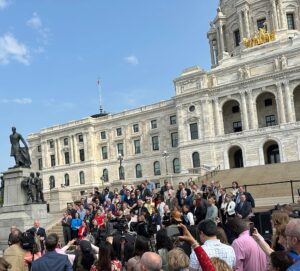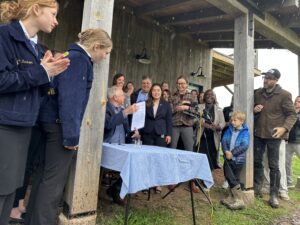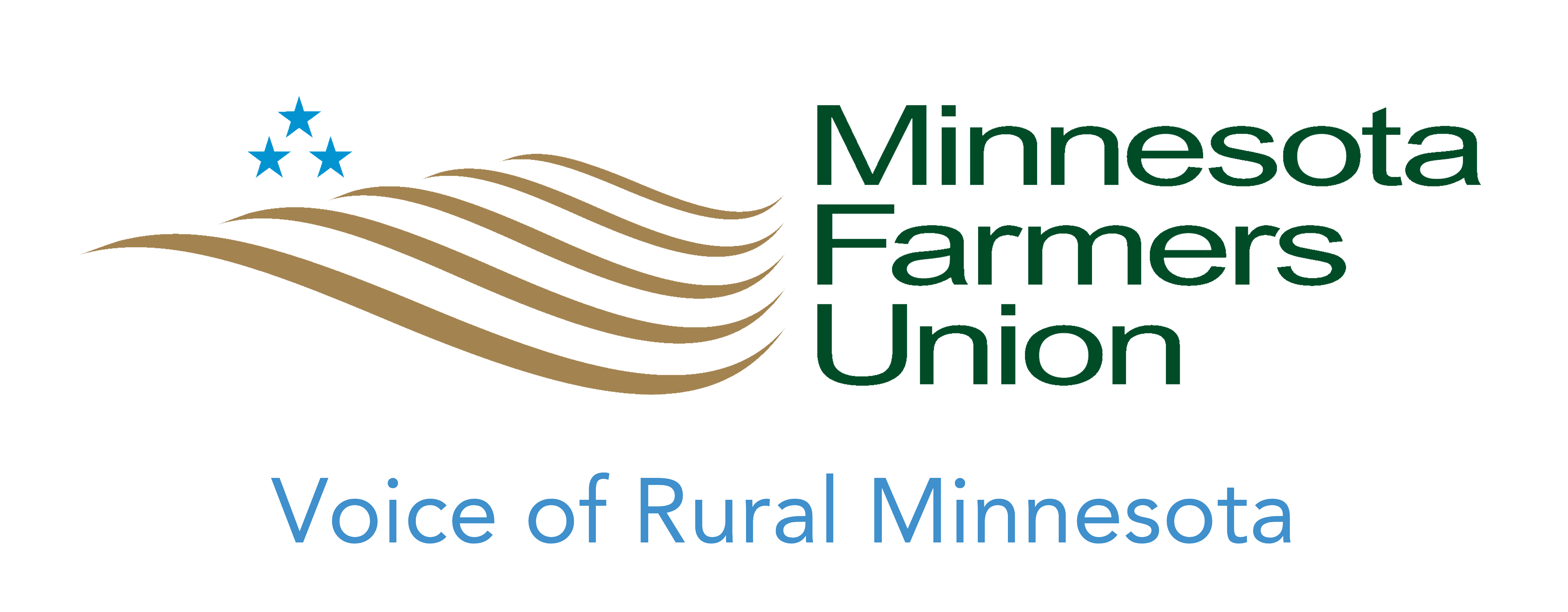Legislative Update: Legislature wraps up work on May 22
With hours to spare, the legislature adjourned on Monday, May 22 after reaching deals on healthcare, taxes, and infrastructure that completed their work on Minnesota’s biannual budget. Through the final days—and particularly when it came to outstanding pieces on healthcare—MFU worked hard to see key priorities across the finish line.

MFU’s Antimonopoly Director Justin Stofferahn, Climate and Working Lands Program Director Ariel Kagan and Government Relations Director Stu Lourey at an event on the state Capitol steps May 24 where Gov. Tim Walz signed the One Minnesota Budget into law.
Gov. Tim Walz signaled the legislature may reconvene to consider action on the proposed Sanford-Fairview merger. But barring him calling a special session, the legislature will not meet again until they reconvene on Monday, February 12, 2024. Because it’s the second year of the biennium, committees will largely stay the same.
Over the weekend, the legislature completed work on outstanding budget bills including on healthcare, healthcare mergers, taxes, transportation and capital investment. Here’s where MFU’s priorities stand in each.
Work to implement public option begins
On healthcare, the deal crafted by Chairs Sen. Melissa Wiklund, DFL-Bloomington, and Rep. Tina Liebling, DFL-Rochester, includes direction for agencies to establish a MinnesotaCare public option that would allow farmers and other small business owners to ‘buy-in’ to the coverage provided to lower-income Minnesotans. With direction from members, MFU has advocated for this proposal since it was first proposed in 2016.
“[Farmers] are hit hard by high premiums and lack of choice between health plans in rural areas,” said MFU President Gary Wertish in a letter to lawmakers circulated throughout session. “This cuts into their farm income and pushes too many farmers to consider giving up the farm, seek a second off-farm job with insurance, or go without health coverage all together—a decision that could prove financially devastating.”
While it’s been a long path to get to this historic win, the work to design and implement the public option is just beginning. The omnibus healthcare bill directs state agencies to conduct an actuarial analysis and submit a federal 1332 waiver—both necessary to leverage federal funding and effectively implement this policy. This analysis and the resulting waiver application will address questions like state cost, enrollee premiums, expected enrollment, and other questions important to creating a program that works for Minnesotans.
A report on this analysis and recommendations from the Commissioner of Commerce are due to the legislature just ahead of the legislature session in 2024. From there—and in addition to the $22 million appropriated for implementation as part of this package—the legislature will likely need to act on other policy and finance items that are necessary for successful implementation.
Following this analysis, negotiations with the federal government, and likely action from the legislature, the bill passed this year directs agencies to implement a public option to be made available to Minnesotans by January 2027.
In addition, MFU supported a provision that will make undocumented Minnesotans eligible for MinnesotaCare, ensuring that those working in agriculture and other essential fields are able to get the healthcare they need.
Antitrust work advances
Also on healthcare, the state legislature approved a bill to strengthen state oversight of large healthcare mergers like that proposed by Sanford and Fairview. It was sponsored by Wiklund and Rep. Robert Bierman, DFL-Apple Valley. The bill passed on a narrow bipartisan basis in both houses with Sen. Jim Abeler, R-Anoka, and Greg Davids, R-Preston, voting to approve the measure.
MFU was a key voice in shaping and advancing this proposal following Executive Committee Member, Josh VanDerPol, offering an amendment to MFU’s Special Orders of Business at MFU’s annual convention. The bill requires entities over $80 million to notify the Attorney General’s office of their intent to merge, adds protections for the University of Minnesota’s charitable assets, and defines a new public interest standard for evaluating proposed mergers. The final point is critical, because instead of relying on narrow definitions in existing antitrust law, the Attorney General will have new tools to challenge a merger based on its impact on access to care, workers and patients.
This work is important, because consolidation drives healthcare costs. As Wertish pointed out in his letter to lawmakers “in 1991 Minnesota spent 16 percent less than the national average on hospital care, but today spends 5 percent more according to data from the Centers for Medicare & Medicaid Services (CMS). Minnesota’s per capita consumption of hospital services has also risen more rapidly than states like California, Hawaii and Rhode Island that have stronger oversight of large healthcare transactions than Minnesota.”

Gov. Tim Walz signed the One Minnesota Budget into law at an event May 24 on the state Capitol steps.
Tax deal reached
Also in the final days, the final tax deal was agreed to by Chairs Sen. Anne Rest, DFL-New Hope, and Rep. Aisha Gomez, DFL-Minneapolis. The bill raises new revenue from targeted taxes on corporations and includes rebate checks of $260 for each family member up to $1,300 for a family of five. The bill also makes historic investments in the child tax credit—set to reduce child poverty by as much as a third—new local government aid for law enforcement, and additional property tax relief.
Provisions MFU advocated for throughout session include:
- Extending and expanding the Beginning Farmer Tax Credit by extending the sunset on the program, allowing family members to participate for sale of ag land to assist in generational farm transition, increasing the credit for sale of agriculture assets from 5 percent to 8 percent and up to $50,000, and increasing the credit for sale of agricultural assets to Black, Indigenous, and farmers of color from 5 percent to 12 percent and up to $50,000.
The final bill makes additional changes to the program, beyond those proposed by Chairs Sen. Aric Putnam, DFL-St. Cloud, and Rep. Samantha Vang, DFL-Brooklyn Center, capping the credit at $4 million per year and reserving half of that amount for emerging farmers until October of each year.
- Funding Soil and Water Conservation Districts (SWCDs) with $15 million per year through a new local government aid program to provide them with the stable, long-term funding they need to best assist our family farmer members in meeting their on-farm conservation goals. This will be the first time in some years that SWCDs were funded outside of the Clean Water Fund.
- Increasing the first tier ag homestead limit from $2.15 million to $3.5 million to better keep pace with skyrocketing land values and provide needed property tax relief. This bill was carried by Sen. Bill Weber, R-Luverne, and was only included in the Senate side.
In future years—provided continued support from members—MFU will continue work to eliminate the sales tax on fencing equipment and ensure that small farms can benefit from ag homestead and other tax credits.
Transportation deal indexes gas tax to inflation
The final transportation deal crafted by Chairs Sen. Scott Dibble, DFL-Minneapolis, and Frank Hornstein, DFL-Minneapolis, raises around $1 billion in new, ongoing revenue to replace aging roads and bridges across the state. The bill does this through indexing the gas tax to inflation and establishing a new $.50 fee on deliveries over $100. Food and other necessary items will be exempted from the delivery fee.
Also included in the transportation package is a provision that will expand the opportunity to earn a restricted farm license to all 15-year-olds—not only those whose parents own a farm. MFU brought this proposal to the bill’s author, Sen. Foung Hawj, DFL-St. Paul, after Yellow Medicine County member Tim Velde raised it at his county convention and delegates to state convention affirmed their support.
All the current protections under law will be retained with this change. Newly eligible young people will still need to complete a certified drivers ed course, pass the driving exam, and submit signed affidavits from their parents and the farmer. And the license would only allow them to drive during daylight hours, within 40 miles of the farm, and to assist with farm work.
Bonding bill passes
Finally—and the last deal to emerge from negotiations—majority and minority members agreed to a capital investment package that includes bonding for projects across the state. You can find text of the final bills here and here to search for local projects. Also key to the final deal on bonding was securing an additional $300 million for struggling nursing homes.
 Last week, the governor traveled north to sign the agriculture bill at MFU member, Hannah Bernhardt’s farm in Pine County. Chairs Putnam and Vang both described the investment in and establishment of a grain indemnity fund as a legacy of the committee’s work this session. You can watch a full recording of the press conference here and read about provisions in the final ag bill here.
Last week, the governor traveled north to sign the agriculture bill at MFU member, Hannah Bernhardt’s farm in Pine County. Chairs Putnam and Vang both described the investment in and establishment of a grain indemnity fund as a legacy of the committee’s work this session. You can watch a full recording of the press conference here and read about provisions in the final ag bill here.
As always, if you have questions about MFU’s legislative work, reach out to Government Relations Director Stu Lourey at stu@mfu.org or (320) 232-3047.
